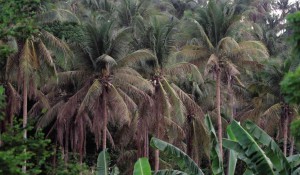Cure vs coco pest opposed, tagged harmful
GENERAL SANTOS CITY, Philippines—A group of coconut farmers here protested the use of toxic chemicals in a government campaign to stop the infestation of coconut trees by coconut scale insects, or cocolisap, saying the method is doing more harm than good.
The infestation is threatening to wipe out the country’s coconut industry with at least a million trees in the Calabarzon region alone infected.
President Aquino issued Executive Order No. 169 and allotted P700 million for a program to stop the infestation.
But the Philippine Coconut Authority (PCA) approved the use of neonicotinoids to combat the pests.
Rene Pamintuan, president of Save the Coconut Movement (SCM), said studies made by the group showed that the use of neonicotinoid, a class of neuroactive insecticides chemically similar to nicotine, would do more harm than good.
Article continues after this advertisement“We already lost our markets abroad when it was learned that our nata de coco was laced with chemicals,” said Pamintuan.
Article continues after this advertisement“Are we going to lose our other coconut product sales when the world learns about chemical injections to our coconut trees?” he added.
Under the government solution, the chemical is injected to the trunk of a coconut tree to poison the pests.
The poison, however, spreads to other parts of the tree, according to Pamintuan.
Nuts from a tree injected with the chemical could not be harvested and water inside the coconut would not be fit for human consumption, he said.
“Because of the infestation and the reported use of chemicals, buko pie of Laguna is now very expensive and manufacturers of coco products are now buying coconuts from Mindanao. That is why, we will never allow PCA to use neonicotinoids in our coconut farms,” Pamintuan said.
“My information was the area where chemical injection was administered on coconut trees was placed under quarantine. Coconut farmers there can no longer consume or sell their coconuts,” he added.
In a position paper, copies of which were distributed to media, SCM asked the government to consider the use of other methods, which other countries had found useful.
SCM said it believed that the negative repercussion of using toxic chemicals against the pests are long term.
Romulo Arancon Jr., administrator of the PCA, said in an interview that the use of neonicotinoids was necessary in Calabarzon where the outbreak, he said, “cannot be addressed with mere pruning.”
“We are using an integrated protocol,” he said. “In addition to pruning, we need to do trunk injection,” he said.
He said the chemical that is used is “certified in Japan and in the Philippines as environment safe.”
“There is no threat to bodies of water being contaminated and public safety is assured,” he added.
Studies show that the chemical dissipates after 51 days during which no harvest can be made.
Arancon said at least 2 million trees had been infected, which he said is not even 1 percent of the country’s 350 million coconut trees.
By August, he said, PCA expects all infected trees to have been treated with neonicotinoid. “We should see results two or three months after that,” he said. Aquiles Z. Zonio, Inquirer Mindanao with a report by Ron Domingo in Manila
